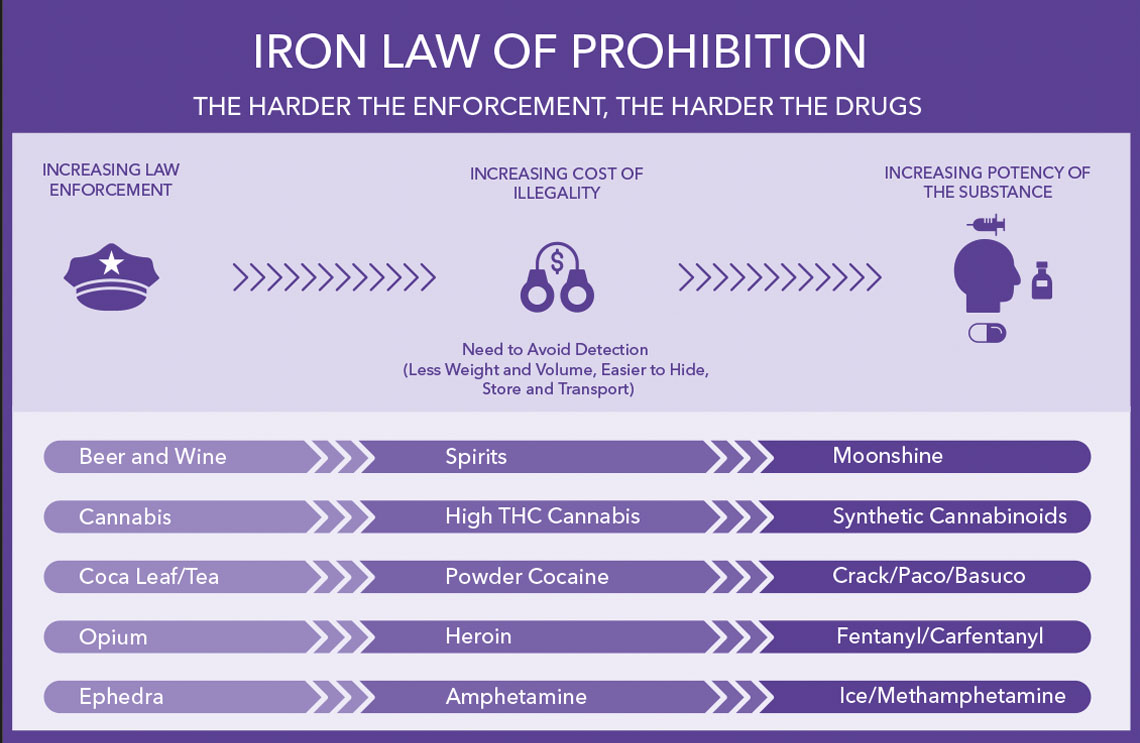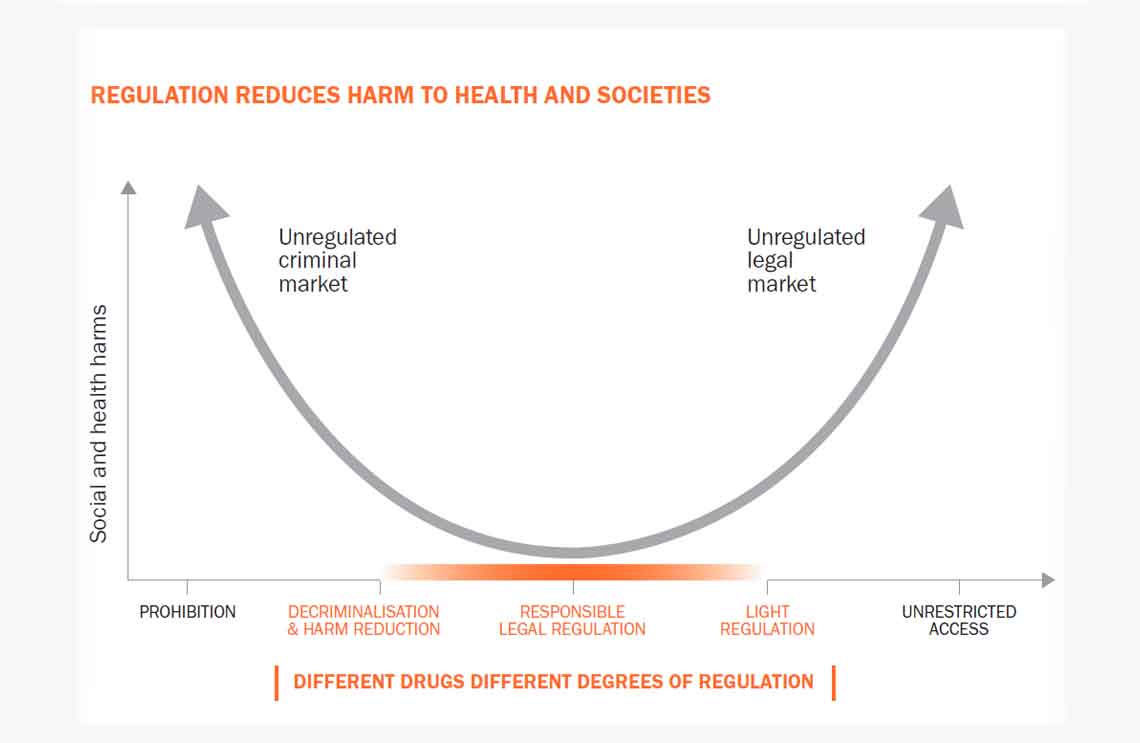Global leaders call to regulate drugs
Drug Foundation Policy and Advocacy Manager Kali Mercier gives a brief rundown of a recent Global Commission on Drug Policy report and its implications for the War on Drugs abroad and potentially here at home.
New Zealand’s recent deaths from synthetic cannabinoids are deeply tragic and should never have happened. A September Global Commission on Drug Policy report shows how they are also, sadly, part of a repeated pattern of harm caused by the international illegal drug trade – and by the international responses to that trade.
Taking a world view free of political agenda can provide a fresh perspective, especially when it comes to the hot potato issue of drugs. The Global Commission has a stunning cast of esteemed movers and shakers, including 12 former heads of state (one of whom is our own Helen Clark). Its report, Regulation: The Responsible Control of Drugs, is unambiguous – rather than continuing with our failed global War on Drugs, we need to regulate criminal black markets out of existence.
Whether by chance or strategy, on the day the report was launched, Donald Trump called for all countries to sign up to a statement doubling down on enforcement approaches. Our Prime Minister took a principled stand and refused to sign. Instead, she emphasised New Zealand’s commitment to following an evidence-based approach and treating drug use as a health issue.
The Global Commission argues that demand for drugs has always existed and will always exist.

Iron law of prohibition: The harder the enforcement, the harder the drugs. Graphic illustrates that increased law enforcement causes the the cost of illegality to rise, which leads to increased potency of substances. - The “Iron Law of Prohibition”—a term coined by cannabis activist Richard Cowan in a 1986 article titled “How the Narcs Created Crack“—proposes that “as law enforcement becomes more intense, the potency of prohibited substances increases.”
If this demand is not satisfied through legal means, it will inevitably be satisfied by the illegal market.
It points out that, despite the unimaginably huge resources put into enforcement, illegal drugs are now the world’s largest illegal commodity market, estimated back in 2005 to turn over a whopping $320 billion – which would mean they make up nearly 1 percent of total global trade.
The illegal drugs market is, of course, completely unregulated, ruthlessly profit motivated and unrestrained by the rules and accountability that guide legal economies. Drug producers are incentivised to increase the potency of products to maximise their profit margins, making drug use ever more dangerous. As an example, during alcohol prohibition, consumption patterns moved from beer to the much more harmful moonshine. In the same way, opium use has been supplanted in many countries by heroin use and now fentanyl. This process is visible in our own country where early-wave synthetic cannabinoids have been replaced by much more dangerous compounds. Sadly, the result has been 40 deaths from synthetics during the past year.
The Commission sets out how the global system is actively undermining the rule of law in developing countries and hindering economic progress. Illegal drug markets promote money laundering, corruption, violence and instability. Poor communities are caught in the crossfire between the need to scrape out a living and repressive government crack-downs.
One example given in the report comes from an indigenous coca grower in Bolivia. Until Evo Morales came to power, her community faced “extreme violence, murder, the imprisonment of so many young men from our community, and the abuse of women. This was our day to day reality … The military would come into our homes at any time of night and day. We were constantly being sprayed with gas.”
Her family continued to grow coca despite the hardships because they had no other means of subsistence.
By contrast, the Global Commission sees regulation as a form of “responsible risk management” by government:
“When compared with policy responses to other risky behaviours – such as dangerous sports, unhealthy diets or unsafe sex – it is punitive drug prohibitions that are ‘radical’ policy responses, not regulation. Drugs should be regulated not because they are safe, but precisely because they are risky.”
What exactly do they mean by “regulation”?
The report is careful to emphasise that regulation is not the same as liberalisation. The purpose is not to make drugs more freely available, but rather to minimise the harm they cause. The Commissioners list a range of different possible approaches to regulation. For example, the riskiest drugs could be prescribed by qualified medical professionals to people with drug dependencies. Day clinics in Switzerland that prescribe heroin are a good example of this approach.
Another option is pharmacy-only supply, where a trained pharmacist can serve as gatekeeper and provide consumers with medical advice and referral to help where needed. This might include additional controls such as requiring purchasers to get a licence or rationing the amount each person may buy. As an example, in Uruguay, cannabis is sold from pharmacies with monthly purchase limits for each consumer. It’s early days for this system and there have been teething problems, but it will be an interesting one to watch.
A third option is sales from licensed stores – most suited for drugs on the lower-harm end of the spectrum. Controls would need to be put in place on price, packaging, marketing and sales to minors. Cannabis retail stores in Canada are a great model for this. Each province has a slightly different approach, but all put public health considerations firmly before profit. This system went live on 17 October, so we’ll have to wait a bit to find out the impacts.
As an example of the success of regulation in reducing health harms, the Commission points to tobacco. Harm from tobacco use, while still huge, has been steadily decreasing in countries such as ours due to controls on price, packaging, marketing and availability plus public health education – only possible in a legal market.
What could this mean for New Zealand?
Well, the Commission suggests taking a cautious and incremental approach. We could start by regulating cannabis – which we have the chance to do in the upcoming referendum. We should also remove criminal penalties for drug use and instead guide people towards health assistance if they need it.
We also want to see a selection of lower-harm psychoactive substances regulated for sale to steer people away from the really bad stuff. We’ve tried this before in New Zealand, but for various reasons, the legislation ran aground. We should try it again and this time get it right.
Let’s face it – the Global Commissioners have all been around the block a few times. They’re not afraid to say what needs to be said. We should sit up and listen.

Regulation reduces harm to health and societies: Graph shows a curve, with prohibition at one end ("unregulated criminal market") and unrestricted access at the other ("unregulated legal market"). In the middle lies responsible legal regulation. - This illustration captures the case for regulation. The spectrum of policy options runs from an unregulated criminal market at one end through to another effectively unregulated market in which products are legal with unrestricted access. The most responsible approach lies between these two extremes.
Recent news

Reflections from the 2024 UN Commission on Narcotic Drugs
Executive Director Sarah Helm reflects on this year's global drug conference
What can we learn from Australia’s free naloxone scheme?
As harm reduction advocates in Aotearoa push for better naloxone access, we look for lessons across the ditch.

A new approach to reporting on drug data
We've launched a new tool to help you find the latest drug data and changed how we report throughout the year.

